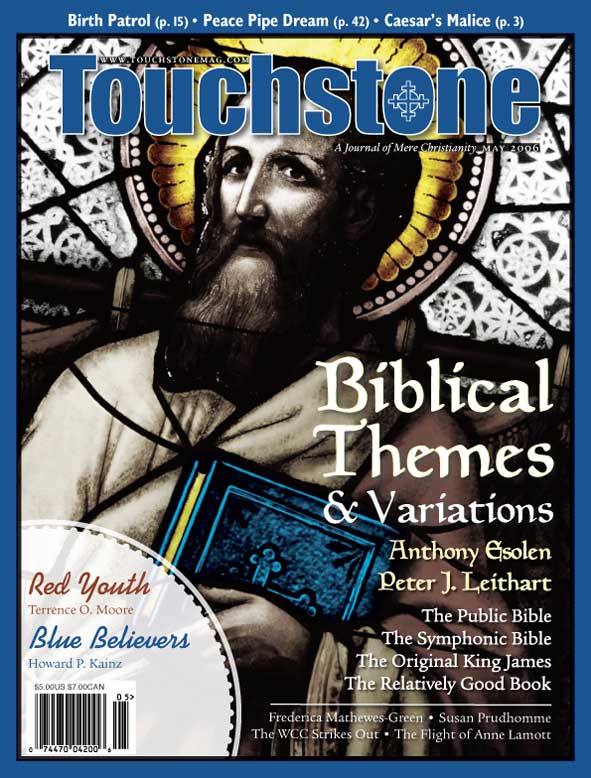Editorial
State of Separation
When Caesar Wants a Thing That Is God’s
by David Mills & Anthony Esolen
The extent to which the Christian can accept Caesar’s help in serving God depends upon the extent to which Caesar gives to God the things that are his. In this country, for a long time, Caesar has given to God some of the things that are his by recognizing and upholding the moral order—not completely or perfectly, by any means, but effectively enough as far as he felt able to go. Caesar was happy to help Christians serve their common ends, and Christians were able to accept his help.
Now, at least in some places, Caesar does not want to help the way he used to, because he no longer gives to God his recognition of the moral order. What he and the Christians once agreed upon—the nature of marriage as the union of a man and a woman, for example—he now sees as prejudice and bigotry. And so, quite rightly from his point of view, he will help Christians only if they now give to him the things that they believe are God’s.
O’Malley’s Defiance
As readers will know, the Commonwealth of Massachusetts forced the Archdiocese of Boston to close its adoption service, after 103 years of helping to place orphans and unwanted children with new families, by giving Catholic Charities an ultimatum: Either allow homosexual couples to adopt children or shut up shop. The state holds that “married” homosexual couples are married in every sense that a man and wife are married, and have every right a man and wife have, and that the state cannot help anyone act otherwise.
The archdiocese had no choice. Cardinal Sean O’Malley’s decision was inevitable: The Catechism of the Catholic Church teaches quite clearly that man is not permitted to will evil that good may result, or to engage in an evil action so that he might preserve the opportunity to do good.
To capitulate to the state would be to cooperate in the grave social evil of undermining the institution of marriage and the order of the sexes, fashioned by God himself; to acknowledge the supremacy of the state in compelling condonement of actions obnoxious to the church’s tenets and to that very social order whose preservation is the state’s sole reason for existence; and to deliver small children the church has in its care into unnatural “families,” not only depriving them of a mother or (more frequently) a father, but suggesting to them the lie that consent alone makes all sexual expression licit.
The archdiocese could not agree, as any fair observer must have foreseen. Then why the compulsion? Homosexual people in Massachusetts can already adopt children; it is unlikely that anyone would be seriously inconvenienced by the church’s policy. The conclusion seems inescapable: The church was given the ultimatum not so that homosexuals would benefit, but so that the church would be hurt, either by a capitulation that would signal its subservience and irrelevance evermore, or by a curtailment of the freedom of Catholics to practice their faith in the public square.
At least some of those who delivered the ultimatum can read and think, and knew that the church that cannot permit the direct and willed killing of an innocent human being so that thousands might be saved from disease, would not be able to hand a single child over to a homosexual couple, even when that action would preserve their opportunity to place thousands of others in real, that is to say natural, families.
That being the case, the enforcers in this case must have been looking forward with complacency to this predictable result. That it would hurt children who would have to wait much longer before finding a family to adopt them, if they found a family at all, did not matter.
Responding to Caesar
David Mills has been editor of Touchstone and executive editor of First Things. He edits the opinion page of the Pittsburgh Post-Gazette.
Anthony Esolen is Distinguished Professor of Humanities at Thales College and the author of over 30 books, including Real Music: A Guide to the Timeless Hymns of the Church (Tan, with a CD), Out of the Ashes: Rebuilding American Culture (Regnery), and The Hundredfold: Songs for the Lord (Ignatius). He has also translated Dante’s Divine Comedy (Random House) and, with his wife Debra, publishes the web magazine Word and Song (anthonyesolen.substack.com). He is a senior editor of Touchstone.
subscription options
Order
Print/Online Subscription

Get six issues (one year) of Touchstone PLUS full online access including pdf downloads for only $39.95. That's only $3.34 per month!
Order
Online Only
Subscription

Get a one-year full-access subscription to the Touchstone online archives for only $19.95. That's only $1.66 per month!
bulk subscriptions
Order Touchstone subscriptions in bulk and save $10 per sub! Each subscription includes 6 issues of Touchstone plus full online access to touchstonemag.com—including archives, videos, and pdf downloads of recent issues for only $29.95 each! Great for churches or study groups.
Transactions will be processed on a secure server.
more from the online archives
calling all readers
Please Donate
"There are magazines worth reading but few worth saving . . . Touchstone is just such a magazine."
—Alice von Hildebrand
"Here we do not concede one square millimeter of territory to falsehood, folly, contemporary sentimentality, or fashion. We speak the truth, and let God be our judge. . . . Touchstone is the one committedly Christian conservative journal."
—Anthony Esolen, Touchstone senior editor










